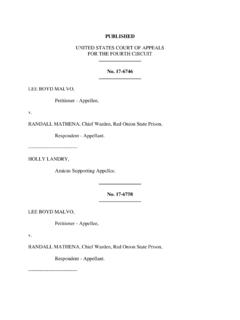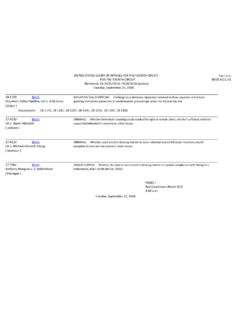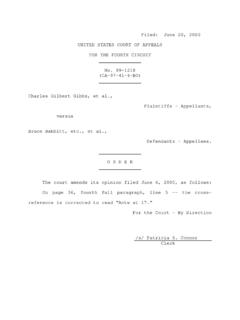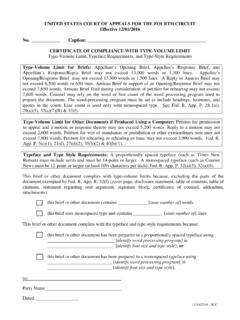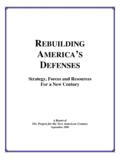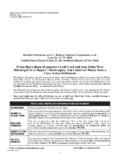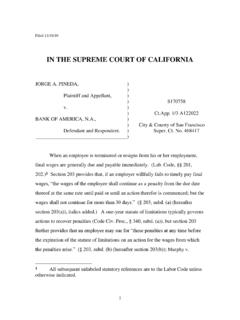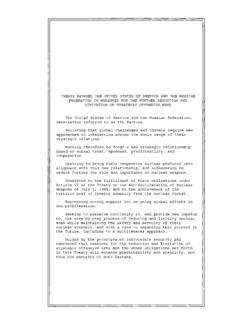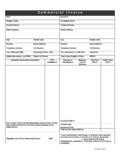Transcription of PUBLISHED - ca4.uscourts.gov
1 PUBLISHED UNITED STATES COURT OF APPEALS FOR THE FOURTH CIRCUIT No. 16-6073 UNITED STATES OF america , Plaintiff - Appellee, v. GERALD ADRIAN WHEELER, a/k/a Bay-Bay, Defendant - Appellant. Appeal from the United States District Court for the Western District of North Carolina, at Charlotte. Robert J. Conrad, Jr., District Judge. (3:06-cr-00363-RJC-3; 3:11-cv-00603-RJC) Argued: January 25, 2018 Decided: March 28, 2018 Before KING, FLOYD, and THACKER, Circuit Judges. Vacated and remanded by PUBLISHED opinion. Judge Thacker wrote the opinion, in which Judge King and Judge Floyd joined. ARGUED: Ann Loraine Hester, FEDERAL DEFENDERS OF WESTERN NORTH CAROLINA, INC., Charlotte, North Carolina, for Appellant.
2 Eric J. Feigin, UNITED STATES DEPARTMENT OF JUSTICE, Washington, , for Appellee. ON BRIEF: Ross Richardson, Federal Public Defender, Interim, FEDERAL PUBLIC DEFENDER WESTERN DISTRICT OF NORTH CAROLINA, Charlotte, North Carolina, for Appellant. Noel J. Francisco, Solicitor General, UNITED STATES DEPARTMENT OF 2 JUSTICE, Washington, ; Jill Westmoreland Rose, United States Attorney, Charlotte, North Carolina, Amy E. Ray, Assistant United States Attorney, OFFICE OF THE UNITED STATES ATTORNEY, Asheville, North Carolina, for Appellee. 3 THACKER, Circuit Judge: In the district court, Gerald Wheeler ( Appellant ) sought to have his habeas corpus petition heard on the merits by means of the savings clause per 28 2255(e).
3 The savings clause provides that an individual may seek relief from an illegal detention by way of a traditional 28 2241 habeas corpus petition, if he or she can demonstrate that a 2255 motion is inadequate or ineffective to test the legality of his detention. 28 2255(e). The district court denied Appellant s savings clause request and dismissed his 2241 petition. But Appellant satisfies the requirements of the savings clause as dictated by our decision in In re Jones, 226 328 (4th Cir. 2000), because a retroactive change in the law, occurring after the time for direct appeal and the filing of his first 2255 motion, rendered his applicable mandatory minimum unduly increased, resulting in a fundamental defect in his sentence.
4 We thus vacate the district court s judgment and remand with instructions that Appellant s 2241 petition be considered on the merits. I. A. Conviction, Sentence, and Direct Appeal In September 2006, a grand jury in the Western District of North Carolina returned a multi-defendant superseding indictment charging Appellant with conspiracy to possess with intent to distribute at least 50 grams of crack cocaine and 500 grams of powder cocaine, in violation of 21 841(b)(1)(B) ( Count One ); possession with intent to distribute at least 5 grams of crack cocaine ( Count Five ); using and carrying a 4 firearm during and in relation to a drug trafficking crime ( Count Six ); and being a felon in possession of a firearm ( Count Seven ).
5 The Government also filed an information pursuant to 21 851, seeking an enhanced penalty based on Appellant s 1996 North Carolina conviction for possession of cocaine (the 1996 Conviction ).1 On April 17, 2007, Appellant pled guilty to Counts One, Six, and Seven of the indictment. His plea agreement provided that as to Count One, Due to .. the [ 851 information], Defendant is facing not less than ten years imprisonment up to a maximum of life imprisonment. Plea Agreement, United States v. Wheeler, No. 3:06-cr-363 ( filed April 3, 2007), ECF No. 66 at 1. In March 2008, the district court sentenced Appellant to 120 months of imprisonment, the statutory mandatory minimum, on Count In so doing, it determined that the 1996 Conviction was a felony drug offense, and as a result, Appellant s enhanced statutory range was 10 years to life in prison.
6 See 21 841(b)(1)(B) ( If any person commits .. a [ 841(b)(1)(B)] violation after a prior conviction for a felony drug offense has become final, such person shall be sentenced to a term of imprisonment which may not be less than 10 years and not more than life imprisonment .. (emphasis supplied)); id. 802(44) (defining [f]elony drug offense as an offense that is punishable by imprisonment for more than one year under any 1 The information also cited a 1998 conviction for cocaine trafficking, but that conviction was later overturned and is not at issue in this appeal. 2 Appellant also received a concurrent 70 month sentence on Count Seven and a consecutive 60 month sentence on Count Six, for a total sentence of 180 months.)
7 5 [state] law .. that prohibits or restricts conduct relating to narcotic drugs ). Without the 1996 Conviction, Appellant s United States Sentencing Guidelines ( Guidelines ) range would have been 70 87 months, and his statutory sentencing range would have been 5 to 40 years. The district court noted, [T]he sentence that is required to be imposed upon you is a harsh sentence. It s a mandatory minimum sentence. I don t have any discretion in that area. 85 We affirmed Appellant s conviction and sentence. See United States v. Wheeler, 329 F. App x 481 (4th Cir. 2009) (per curiam). B. First 2255 Motion On June 29, 2010, Appellant filed a motion to vacate, set aside, or correct his sentence pursuant to 28 2255.
8 He alleged that his counsel was ineffective for, inter alia, failing to argue that the 1996 Conviction did not qualify to enhance his sentence. See 116 17 ( [C]ounsel in this matter[] allowed an error to proceed uncorrected .. The term of [the 1996 Conviction] didn t exceed one year[;] the maximum punishment that he could receive was[] eight months .. ). The district court dismissed the 2255 motion on March 17, 2011, and denied a certificate of appealability ( COA ), explaining that Appellant s argument was foreclosed by this court s decision in United States v. Harp, 406 242 (4th Cir. 2005), and this court s panel decision in United States v.
9 Simmons, 635 140 (4th Cir. 2011). 3 Citations to the refer to the Joint Appendix filed by the parties in this appeal. 6 See 204. Those decisions held, [T]o determine whether a conviction is for a crime punishable by a prison term exceeding one year [under North Carolina law], .. we consider the maximum aggravated sentence that could be imposed for that crime upon a defendant with the worst possible criminal history. Harp, 406 at 246 (second emphasis supplied); see also Simmons, 635 at 146. Thus, the district court reasoned that although Appellant received a sentence of six to eight months for the 1996 Conviction, his offense was punishable by imprisonment for more than a year because it was a Class I felony, which carries a maximum sentence of 15 months.
10 204. Thus, [a]ny challenge [to the 1996 Conviction] made by Petitioner s counsel would have failed. Id. Appellant filed a pro se motion to reconsider, again contending that the 1996 Conviction did not qualify as a felony drug offense. And again, the district court denied the motion. Appellant filed a notice of appeal on April 14, 2011, and a motion for COA with this court on August 3, 2011. While the motion for COA was pending, this court, sitting en banc, overturned the panel decision in Simmons. See United States v. Simmons, 649 237 (4th Cir. 2011) (en banc) (hereinafter Simmons ). We determined that in deciding whether a sentencing enhancement was appropriate under the Controlled Substances Act, a district court could no longer look to a hypothetical defendant with the worst possible criminal history.


